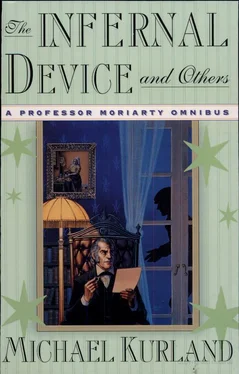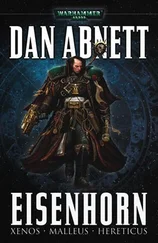"I understand," Moriarty said.
"You must also understand that the Tsar, my master, is a great friend of Great Britain and your Queen."
"Three wars in the past sixty years," Moriarty reminded Zyverbine.
"His father." Zyverbine shrugged. "Besides, they were mere differences of opinion. But they have created a climate where England distrusts Russia. One little mistake—"
"The mistaken blowing up of one battleship," Moriarty suggested.
"Exactly! And so Trepoff must be stopped."
"Can't you recall him?" Moriarty asked.
"The Belye Krystall is a secret organization within a secret organization," Zyverbine said. "They are fanatical in their beliefs and actions. Even the Tsar himself could not order Trepoff to stop. He believes that he acts for the greater good of the state and expects no reward beyond the successful completion of his task. In fact, he would gladly sacrifice his life to accomplish his objective. Such men are infinitely dangerous."
"Have you considered informing Scotland Yard or the British Secret Service?"
"And tell them what?" Zyverbine demanded. "That a representative of the Russian Secret Police is planning to commit a violent crime against an unknown objective and we'd be obliged if they stopped him? First of all, it would make us look like fools; and second of all if they didn't catch him, they would always suspect that we had planned it that way. No. This way, if he isn't stopped, there is always the chance that he'll get away with it — and we'll have to settle for that."
Moriarty rubbed his slender hands together. "I must confess that I find the problem an intriguing one," he said. "You want me to discover one man, whom you cannot describe, out of the population of Great Britain, before he commits an unknown crime of magnificent proportions." He thought for a minute. "I suppose he speaks fluent English?"
"Like a native."
"Good, good," Moriarty said. "An intriguing problem, indeed. You must tell me what is known of this man and his methods. I assume something is known."
"We have an extensive dossier on Trepoff and the Belye Krystall," Zyverbine said. "Of course, much of it is guesswork, rumor, unconfirmed reports, gross exaggeration, and deliberately misleading facts planted by sympathizers."
"Better and better," Moriarty said. "This case will give free rein to the processes of logic — the one touchstone by which one can infallibly separate truth from fiction. I think I can promise you that, given sufficient time before he attempts this outrage — and I do not need much time — Trepoff will be apprehended."
"Then you will work for us?" Zyverbine asked.
"I shall."
"You see a way to proceed?"
"I see five," Moriarty said. "Two of them look especially promising."
"I will get you the dossier," Zyverbine said, rising from his desk. Moriarty held up his hand. "First," he said, "there is the matter of my fee."
FIVE— A BARGAIN
Have the courage to live. Anyone can die.
— Robert Cody
The mud-faced warder peered in through the small, barred window in the cell door. "Is here," he announced, positively.
Barnett sat up and rubbed his eyes. "What?"
"Is here! You see?"
"Who's here?" Barnett asked, squinting into the bright square of light framing the warder's face. "The American minister? Did the World 's lawyer show up?"
"Is here," the warder repeated. Then he stomped away down the corridor.
It seemed hours before he returned, followed by a tall man in a black frock-coat. The warder worked the heavy bolt on the door and pulled it outward on its ancient hinges. "Go in," he said. "I wait."
Barnett's eyes took a moment to adjust to the light from the gas lamps in the corridor that now flooded into his unlit cell. "Professor Moriarty!" he exclaimed, recognizing his tall visitor. "What are you doing here?"
"I might well ask the same question of you. However, to be specific, I have come to talk with you." He looked about. "There is no chair?"
"Here," Barnett said, moving to the far end of his wooden cot. "Sit here, please."
"Very well," Moriarty said, sitting on the cot next to Barnett.
"How did you get here?" Barnett demanded.
"I bribed the governor of the prison," Moriarty said. "It seems to be the way they do things here."
"Yes, but I mean why?" Barnett asked. "That is, I'm delighted to see you. If you've come to help me, I'm overwhelmed." He passed his hand over the stubble on his face. "You will forgive my appearance. For some reason, they won't allow me to shave."
"It's almost impossible to notice your appearance in this murk. I would say that I've come to help you. Whether you agree or not will depend upon what, exactly, you think your situation is."
"What do you mean?" Barnett asked. He gestured around him. "This dank, tiny, stone cell is my situation." There was a tremor in his voice which he did his best to suppress.
"Describe for me," Moriarty said, "the events of the past two weeks as they seem to you."
"That — that—" Barnett paused, swallowed what may have been an involuntary sob, and took a deep breath. "You must excuse me," he said. "It's the damp."
-
Barnett thought back over all that had happened to him in the past few weeks. Two weeks and three days ago he had been a respected, well-paid correspondent for the New York World, and now he was reduced to the state of a wretch, chained to the wall of a cell in the great stone prison of Mustafa II.
"This all began," he said at last, "when the Garrett-Harris submersible blew up in the water. Have you heard about that?"
"Pay no mind to what I have heard, or what I may know," Moriarty said. "Tell me what happened to you. Tell it in your own way, relating what facts you think are relevant."
"But why are you concerned?" Barnett asked. "You know that I am sentenced to death?"
"We will discuss what I know and why I am here at the proper time," Moriarty said patiently. "Bear with me, please." He shifted his position on the cot, and put his hand down where he had been sitting. "The straw is damp," he said. "Intolerable!"
"I wish that were all I had to tolerate," Barnett told him. "You know they think I'm a spy? They question me hour after hour some days, and then days go by when I see no one at all."
"The fact that the Osmanli authorities believe you to be a spy is probably the only thing that is keeping you alive," Moriarty said. "The tradition here is to execute with the bowstring within three days after sentencing."
"The bowstring?" Barnett touched his hand to his throat. "I thought they cut off your head."
"Not in cases of espionage or treason. The sentence is to be garrotted by a fine bowstring. If you happened to be of royal blood, a silken bowstring is specified. You are not, I presume, of royal blood?"
Barnett jumped to his feet. "What do I care what sort of bowstring they choke me with?" he demanded angrily. "I did nothing! Nothing! Why won't anybody believe me?"
"I, for one, believe you. Tell me what happened. And please try to remain calm." He gestured toward the warder standing outside, who was becoming concerned at Barnett's activity. "He may decide that visitors overexcite you and request me to leave."
Barnett sat down. "I'm sorry," he said. "My story — let me tell you my story. I only hope to God that you can help.
"Lieutenant Sefton — the gentleman who came to your aid with me — was murdered in his room the evening after the submersible was destroyed. You've surely heard about the murder?" Moriarty opened his mouth to speak, but Barnett interrupted him, "Yes, yes; again I apologize. I shall pay no attention to what you may or may not know. I'll just tell you my story as it happened.
Читать дальше












